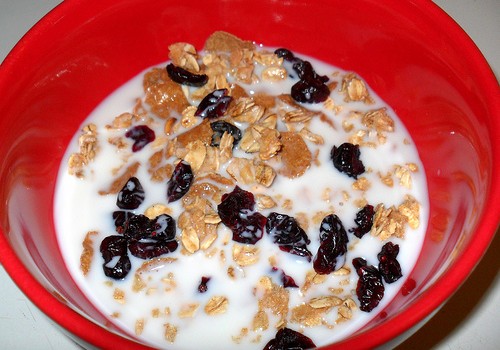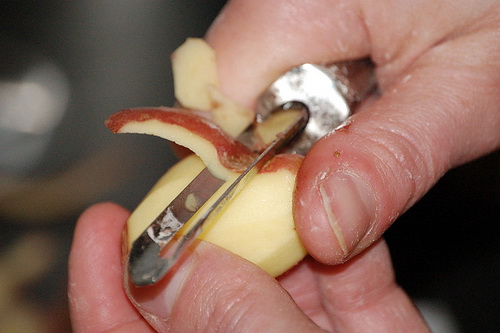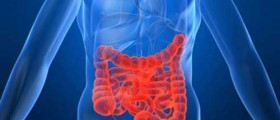
Identify Your Triggers
Crohn’s Disease is an immune deficiency state that may affect any area of the gastrointestinal tract, from mouth to anus. The most frequent symptoms are cramping, abdominal pain, diarrhea, nausea and vomiting, anal fistulae, dramatic weight loss, inflammation of bile ducts, painful red-eye, painful sensitivity to light, and skin lesions such as pyoderma gangrenosum and erythema nodosum. Crohn’s Disease has a clear genetic component. Abnormal immune function, microorganisms such as Yersinia, Mycobacterium and Listeria may contribute to the disease. A high protein diet, diet high in omega 6 fatty acids, smoking, hormonal birth control pills, isotretinoin and stress are known triggers of the disease.
- Important notification about information and brand names used in this slideshow!
- Photo courtesy of U.S. Navy photo by Mass Communication Specialist 3rd Class Kristopher Wilson by Wikimedia Commons : commons.wikimedia.org/wiki/File:US_Navy_061218-N-5345W-055_Chief_Hospital_Corpsman_Tracy_Adjip_performs_a_sonogram_on_a_patient_wh
- www.emedicine.com

Yogurt
The type of yoghurt to consume needs to be selected carefully. For a diabetic patient, high sugar content would be detrimental, while a lactose intolerant person should stay away from milk sugars. The ingredients' label deserves a careful read, in other words. A study has shown that consuming yoghurt containing probiotics for one month reduced the inflammatory reaction associated with Crohn’s Disease as well as some of its peripheral features. It did not show any harmful effects on both the study and control groups. The study showed that yoghurt with probiotics was helpful for HIV/AIDS patients with associated Crohn’s Disease as well. It is recommended as a potential immune-modulator and a nutritional supplement in Crohn’s Disease.
- Important notification about information and brand names used in this slideshow!
- Photo courtesy of Eunice by Flickr : www.flickr.com/photos/ejchang/3730191634
- www.emedicine.com

Oily Fish
Omega 3 polyunsaturated fatty acids are potent immune-modulators that have been shown to provide significant relief to immune-mediated diseases such as Crohn’s Disease, rheumatoid arthritis and psoriasis. Fish oils are rich in omega 3 fatty acids. Studies have shown that dietary supplementation with omega 3 fatty acids reduces the production of prostaglandin E2 and interferon gamma which are inflammatory mediators that cause immune-mediated cell damage. These inflammatory mediators are secreted by circulating macrophages and lymphocytes. Fish oils increase the production of thromboxane, shorten the duration of inflammation, reduce the severity of lesions in the colon and limit the progression of the disease.
- Important notification about information and brand names used in this slideshow!
- Photo courtesy of Alpha by Flickr : www.flickr.com/photos/avlxyz/4091835039/
- www.emedicine.com

Eat Plenty Fruits And Vegetables
A systematic review of clinical researches done in the USA revealed that regular consumption of fruits, vegetable and fiber was associated with a lower risk of Crohn’s Disease. Antioxidants help prevent inflammatory cell damage in Crohn’s Disease patients. Blueberries and tomatoes contain a large amount of anti-oxidants. Vitamin B is essential for cellular division and maturation, and therefore for repair of damaged tissue. Dark green leafy vegetables are an excellent source of vitamin B. Other micronutrients such as folic acid, calcium and zinc are essential for cell division and repair. Vitamin D and calcium are required to maintain good bone density while on steroid treatment for Crohn’s Disease. Glutamine is essential to maintain good intestinal function. Fruits and vegetables provide the daily dietary requirement of all these essential nutrients.
- Important notification about information and brand names used in this slideshow!
- Photo courtesy of Trace Nietert by Flickr : www.flickr.com/photos/53553325@N06/8543057650/
- www.emedicine.com

Cooked Carrots
Cooked carrots are an excellent source of vitamin A, folic acid, calcium, potassium, magnesium, fluoride and sodium. Vitamin A is required in cell maturation and differentiation, color vision and immune function. Folic acid is essential to form tetrahydrofolate which is essential in DNA synthesis, and is a key component of immunity, cell division, cell repair. Folic acid is also required for maintaining good neural function. Calcium is essential to maintain bone density. Crohn’s Disease is treated with steroids which may cause osteoporosis — so calcium and Vitamin D are essential to maintain mass. Potassium is a key intracellular cation essential for maintaining cell membrane potentials and nerve conduction. Magnesium is a cofactor in many important biological interactions.
- Important notification about information and brand names used in this slideshow!
- Photo courtesy of George Grinsted by Flickr : www.flickr.com/photos/imgeorge/5401411865/
- www.emedicine.com

Cheese
The type of cheese to eat needs to be chosen carefully, because Crohn’s Disease can cause lactose intolerance as a side effect of damage to the intestinal lining. It is always better to go for harder aged cheese like Cheddar or Romano rather than softer cheese varieties because they have a lower lactose content. Cheese also provides probiotics. Probiotics have been shown to reduce the inflammatory reaction in Crohn’s Disease patients, and it also helps replace the gut commensals (micro-organisms than normally colonizes the gut and prevent formation of opportunists pathogens). This will reduce the frequency of diarrhea. But the downside is that, due to the high micro-organism content, cheese may give you flatulence.
- Important notification about information and brand names used in this slideshow!
- Photo courtesy of Steel Wool by Flickr : www.flickr.com/photos/wynnie/1481949658/
- www.emedicine.com

Avoid Cereals High In Fiber
Cereals high in insoluble fibers are difficult to digest. Crohn’s Disease damages the lining of the intestines, due to immune mediated reactions. Intestinal cell membranes are the key location of many digestive enzymes such as carbohydrase, protease, and lipase. When these enzymes are absent, the initial steps of carbohydrate, protein and lipid hydrolysis cannot occur. Digestion is interrupted and more stools are formed. Because the fiber content in the food is high, water is absorbed into the intestinal lumen and liquid stools form. Because the intestinal lining is damaged, microorganisms can enter the gut wall easily and blood and mucus diarrhea is the result.
- Important notification about information and brand names used in this slideshow!
- Photo courtesy of Jason Toney by Flickr : www.flickr.com/photos/misterjt/5299323158/
- www.emedicine.com

Skinless Potatoes
Skinless potatoes are rich in soluble fibers, which are easily digestible. In one serving 150 gram serving of skinless potatoes, 20 grams of total carbohydrates are present. Out of these, 18 grams are soluble fibers. Skinless potatoes do not contain any fats, and therefore the chance of triggering a lipid induced flare up is very low. This alone makes skinless potatoes a good choice for Crohn's Disease patients, but there are other benefits too. Skinless potatoes are rich in vitamins as well. These are essential for immuno-modulation and tissue repair and to keep the whole body working properly.
- Important notification about information and brand names used in this slideshow!
- Photo courtesy of Alice Wiegand by Wikimedia Commons : commons.wikimedia.org/wiki/File:Kartoffelsch%C3%A4len.jpg
- www.emedicine.com

High-Calorie Liquid Formulas
Crohn's Disease patients' fluid intake needs to be very high because of the diarrheal loss of water that takes place during a Crohn’s flare up. Acute diarrhea should make you follow a the replacement regimen — 100ml of water for one episode of diarrhea. If the patient has fever, it needs to be even higher due to water evaporation through skin. Severe dehydration will reduce the blood flow to the kidneys and in some cases acute renal failure develops. In general, the urine output should be more than 0.5ml/Kg/hour. High calorie liquid preparations have merit because they provide the extra energy needed for general recovery and cell repair as well as the additional requirement of water.
- Important notification about information and brand names used in this slideshow!
- Photo courtesy of Renée Suen by Flickr : www.flickr.com/photos/sifu_renka/4479374198/
- www.emedicine.com

Other Treatment Methods
Drug treatment includes antibiotics for blood and mucus diarrhea against probable causative microorganisms, antispasmodic agents to treat cramping and abdominal pains (unless there is clear evidence of bowel obstruction), and sulfasalazine and corticosteroids to reduce the inflammatory reaction. Methotrexate, infliximab and natalizumab are used as immune-modulators. Surgical treatment is indicated if there in the presence of persisting, severe disease even with regular high dose corticosteroids, a dilated large bowel (toxic megacolon) and persistent bleeding. Surgical treatment is the only option if bowel cancer occurs. Crohn’s Disease carries a risk of developing bowel malignancies due to repeated damage and repair of highly labile tissue.
- Important notification about information and brand names used in this slideshow!
- Photo courtesy of Cam Switzer by Flickr : www.flickr.com/photos/camswitzer/3292254672/
- www.emedicine.com



























Your thoughts on this
Loading...